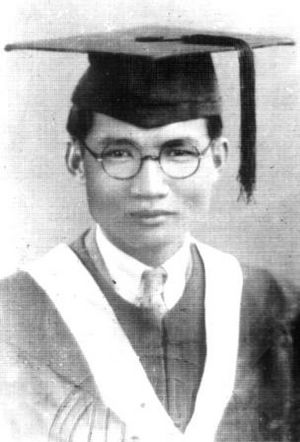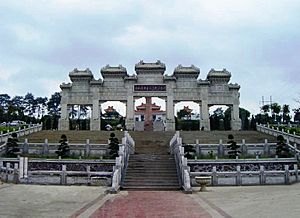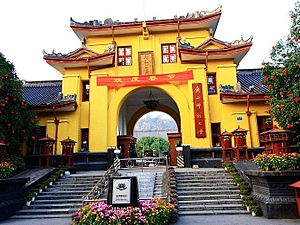Huang Xianfan facts for kids
Quick facts for kids
Huang Xianfan
|
|
|---|---|

Huang Xianfan graduation photo
|
|
| Born |
Gan Jinying (甘錦英/甘锦英)
13 November 1899 Fusui, China
|
| Died | 18 January 1982 (aged 82) Guilin, China
|
| Resting place | Guangxi Government Cemetery |
| Nationality | People's Republic of China |
| Education | Beijing Normal University(1926–1935) and Tokyo Imperial University (1935–1937) |
| Occupation | Representatives of the National People's Congress (NPC), Members of the CPPCC National Committee |
| Years active | 1954–1958, 1980–1982 |
| Known for | The father of Zhuang studies (壮学之父) and The leaders of Bagui and Wunu School (八桂学派和无奴学派领袖) |
| Political party | Chinese Peasants' and Workers' Democratic Party |
| Spouse(s) | Liu Lihua (刘丽华, Teacher) |
| Children | 9 |
Huang Xianfan (zhuang: Vangz Yenfanh; simplified Chinese: 黄现璠; traditional Chinese: 黄現璠; pinyin: Huáng Xiànfán; Wade–Giles: Huáng Hsiènfán) (November 13, 1899 – January 18, 1982) was a famous Chinese historian, someone who studies different cultures (an ethnologist), and a teacher.
He was the first person from the Zhuang ethnic group to graduate from college. He studied at Peking University in the 1920s, learning from top historians and language experts. Huang was the first to write a complete history of the Zhuang people. He also strongly believed that there was no slavery in the history of the Zhuang people or in Chinese history as a whole.
His book, General History of the Zhuang, was the first major research book about the Zhuang people's past. He also started the "Bagui School," which was the first group in China focused on studying different ethnic groups. Many people see Huang as one of the main founders of modern Chinese ethnology, which is the study of cultures and peoples.
Contents
Biography
Early Life and Education
Huang Xianfan was born on November 13, 1899, in Fusui County, Guangxi province, during the Qing dynasty. His first name was Gan Jinying, but he was later adopted by the Huang family and renamed Huang Xianfan.
His father, Gan Xinchang, was a Zhuang farmer. He was strict but taught Huang about classic books when Huang was six years old. Huang's uncle also noticed his intelligence when he was young. Because of this, his family sent him to study old Chinese texts.
At age nine, Huang went to a traditional Chinese school. He studied Four Books and Five Classics to prepare for the Imperial examination. However, as a teenager, he didn't like the school system, especially the focus on writing eight-legged essays. Huang preferred history books like Records of the Grand Historian.
In 1922, he went to Guangxi Third Normal college. In 1926, he started studying at Beijing Normal University. There, he learned from famous teachers like Chen Yuan and Qian Xuantong. Over nine years, he earned his diploma, bachelor's, and postgraduate degrees. He wrote many academic papers and books about ancient history, society, politics, and culture.
While at Beijing Normal University, Huang also taught language and history at a private high school in Beijing. In 1932, he and his students created an academic group called Beilei Xueshe, which published academic books. In 1935, he traveled to Japan and studied at Tokyo Imperial University. He was taught by well-known Japanese historians, Sei Wada and Katō Shigeru.
Career as a Professor
In November 1937, Huang Xianfan returned to China. He became a history professor in Guangxi, teaching at Sun Yat-sen University and Guangxi Normal University. He focused his studies on Chinese anthropology and folklore. He was the first university professor from the Zhuang ethnic group in China and the first from Chongzuo city.
During his career, he worked as a researcher at the Guangxi Educational Institute. He was also the head of the Chinese department and a curator at Guangxi University. He directed the library at Guangxi Normal University.
When the People's Republic of China was founded in 1949, Professor Huang Xianfan was chosen as a director of the Chinese People's Association for Friendship with Foreign Countries. He was the only representative from Guangxi's cultural and education fields. After 1954, he was elected as a representative to the first National People's Congress. He also served on the Ethnic Affairs Committee of the NPC and the International Culture Liaison Committee of the CPC. He was also elected to the People's Government of Guixi Zhuang Nationality Autonomous Region and the Council of Guangxi province.
During a period of more open discussion in 1956–57, he disagreed with the Communist Party's education policy. However, the political situation changed, and he was criticized during the "Anti-Rightist Movement." In 1957, Huang had to confess his "crimes" in front of many groups. Many articles attacked him, some unfairly. In 1958, he was removed from the Ethnic Committee of the NPC. He was wrongly labeled as one of the "five rightist historians" and faced harsh treatment during the Cultural Revolution. He was abused and could not publish his academic work.
In 1979, the Chinese government corrected the false accusations against those labeled as "rightists." Professor Huang Xianfan was then appointed as a counselor of the Chinese Ethnic Association and an editor for the Encyclopedia of China. He also became a counselor for the Institute for Studies on Southwest Minorities and a vice-chairman of the institute for studies on Chinese Baiyue Ethnic History. He was elected as a committee member of the fifth congress of the CCPPCC. During this time, he helped the Chinese government correct many other political cases that were wrongly handled.
Throughout his life, Huang Xianfan taught at many universities and influenced many students. In his later years, he started Li Jiang Sparetime College and became its head. He was a pioneer in setting up private higher education in China after 1949. In November 1999, Guangxi Normal University held a big event to celebrate Professor Huang Xianfan's hundredth birthday. The university later published two books in his memory. Today, Guangxi Normal University and Guilin high school have scholarships named after him.
Family Life
Huang Xianfan had two wives, Lanmei and Liu Lihua. They had eleven children. Huang was strict but effective in their education, and all his children became successful. Two of them became professors at Chinese universities, including Huang Xiaoling, a well-known medicine professor in Guangxi. People often call Huang Xianfan's family a "family of educators" because he, his wife, and most of their children worked as teachers or professors.
Academic Research Activities
Early Ethnographic Research
In August 1943, Huang Xianfan led a group to do research on different ethnic groups in the border region of Guizhou and Guangxi. In April 1945, he led another group to research people living in the South Guizhou border. They did a lot of academic work in these ethnic areas, making Huang a pioneer in studying where different ethnic groups live.
Investigations at Guangxi University
In June 1951, Huang Xianfan joined a central government group focused on ethnic issues. He was a vice-leader of the Guangxi sub-group. They visited ethnic areas in Guangxi to offer support and conduct investigations. In March 1952, he and his students went to areas like Duan, Donglan, and Nandan for more research.
In the summer of 1952, they visited Chongzuo, Debao, Jingxi, and Longluo of Fusui for field studies. They collected many historical items from local leaders, including materials about Nong Zhigao's uprising and the anti-Qing dynasty movement led by Wu Lingyun. In June 1953, Huang formed a historical relics investigation group from Guangxi University. He led the group to visit and study Yao, Maonan, Miao, Zhuang, and Mulao minorities, collecting many historical items and information.
Research at Guangxi Normal University
In March 1954, Huang went to Gui county to investigate the living conditions of the Zhuang people. He also collected historical and revolutionary materials about Huang Dingfeng and the Taiping rebellions in Gui County.
In April 1954, a plan was made to investigate the social and historical conditions of Chinese ethnic groups. Huang Xianfan led the Guangxi group, focusing on the Zhuang ethnic group. He guided the largest and most in-depth investigation of ethnic history and traditional culture ever done in Guangxi. They gathered valuable information, which helped future research on Zhuang culture and led to the creation of the Guangxi Institute of Ethnic Studies. This work was crucial for identifying the 56 ethnic groups in China, a pioneering effort that gained international attention. This is why ethnic study experts called Professor Huang a founder of modern Chinese ethnology.
In July 1978, Huang formed another research team. They went to Nongzhou, Pingxiang, Ningming, and Congzuo districts. They collected important historical materials and studied the ancient mountain frescos of Ningming. In November 1979, Huang led a team to Baise, Tianyang, Tiandong, and Bama districts to investigate and collect historical information. In March 1981, he went to Sichuan to attend a national meeting on cliff burials and conducted academic research there.
Academic Ideas
Views on History
Huang Xianfan always stressed the importance of "independent academic research" and believed in academic freedom. His main rule for research was "be honest and don't just follow what authorities say." He thought that academic research should have "no authorities, no ends, no prohibitions."
Professor Chen Jisheng noted that Huang's ideas combined traditional Chinese history studies with new Western history theories. Huang wanted to connect the ancient Chinese idea of "seeking truth" with modern "New History" ideas. He made a big contribution to how "New History" was practiced in China.
Huang often criticized general history books published in the 20th century. He felt they didn't describe Chinese ethnic groups enough, making it seem like China's history was only the history of the Han Chinese. He fought against the idea that China was only equal to the Han people. He also openly disagreed with making Marxism too rigid or dogmatic. In 1957, Huang suggested that there was no "slave society" stage in Chinese history. Later, in 1979, he famously stated, "no slave society in Chinese history." Many scholars agreed with him, calling him the "leader of the Wunu school."
Views on Ethnic Groups
Huang Xianfan always spoke out against ethnic chauvinism, which is the belief that one's own ethnic group is superior. He believed that ethnic problems were caused by unfair treatment between groups, which led to conflicts throughout history. Professor Huang supported equality for all ethnic groups worldwide. He also believed in a "spiritual civilization with scientific attitude" when studying ethnic groups.
Through his work, he became a leader in Zhuang studies in the 20th century, earning him the title "father of Zhuang studies". Based on his ideas, he formed a "Huang group" for Zhuang studies and the famous Bagui School in Chinese history. The Huang group is a pioneering part of the Chinese Bagui School of ethnology. It started in the 1950s and is still active today. The Huang group includes Huang Xianfan and 18 of his students, often called his "18 elite disciples." These students are now professors or researchers, mostly working in Guangxi Zhuang Autonomous Region and Guangxi Normal University. This group includes both Zhuang and Han scholars.
The Bagui School is a group of ethnologists who followed Huang Xianfan's ideas. It became a recognized school at Guangxi Normal University in the mid-1950s. This school has been active in Chinese ethnology since the second half of the 20th century. It was the first ethnic studies school in China, heavily influenced by Professor Huang Xianfan. Many of its members were Zhuang people who deeply cared about their nationality. They were scholars from different universities and research institutes who studied the culture and history of the Zhuang people in Guangxi. They all shared a common view against ethnic chauvinism, building their research on the idea of equality for all ethnic groups in China and a scientific approach to ethnic studies. Today, the Bagui school continues as an ethnology school, with several branches that also study the history of the Zhuang people. For these reasons, Huang Xianfan was also honored as a leader of the Bagui School.
Views on Education

Huang Xianfan began his research on education when he was an assistant director at the Institute for Education Studies in Beijing Normal University. He believed that a key goal of education was to help students develop healthy personalities. He thought that combining knowledge with action was essential for this. In 1981, he founded Li Jiang Sparetime College and became its headmaster. This made him a pioneer in starting private higher education institutions in China after 1949.
During his forty years of teaching, he always aimed to help students develop noble characters. Mr. Liang Chen Ye, a former vice-chairman of the Zhuang Autonomous Region of Guangxi, once praised him, saying that "Professor Huang Xianfan devoted his whole life to Chinese higher education and was a great master of education of his generation. He was very famous in modern Chinese history." Because Mr. and Mrs. Huang and most of their children taught in schools or universities, Huang Xianfan's family is known as a family of educators.
Academic Style
Professor Huang Xianfan's academic style had three main features:
- Pioneering study on history.
- Using multiple types of evidence.
- A new method for checking historical texts.
Building on Wang Guowei's "dual evidence method," Professor Huang created his own "tri-evidence method." This new research method combined archaeological materials (like physical objects and writings), historical documents, and ethnological materials (like historical remains and oral stories). He used this method in his studies of ancient Chinese history and culture.
Major Works
- Outline of Chinese History. Beijing: Beiping Culture Society, 1932, 1934.
- Foreign history of high school. Beijing: Beiping Lida Bookstore, 1933.
- Brief Introduction on Tang Dynasty. Shanghai: Commercial Press, 1936. 1937 (Reprint 2009 (Jilin Publishing Group Reprint).
- Save Nation Movement of Tai-Xue students in Song Dynasty. Shanghai: Commercial Press, 1936, 1956, 1965 (Taipei: Wenxing Bookstore Reprint), 1996 (Shanghai: Shanghai Bookstore Reprint), 2000 (Jilin Publishing Group Reprint).
- Speech of Chinese History. Nanning: Guangxi University, 1938.
- Chinese social history in Yin Dynasty. Nanning: Guangxi University, 1950.
- History of China's feudal society. Nanning: Guangxi University, 1952.
- Selected Readings in Chinese history books. Guilin: Guangxi Normal University, 1953.
- Zhuang history of resistance to oppression. Nanning: Guangxi social and historical investigation team, 1957.
- Brief History of the Zhuang. Nanning: Guangxi Peoples's Press, 1957.
- Establishment of the Soviet regime in Youjiang. Guilin: Guangxi Normal University, 1957.
- Survey of the Guangxi Daxin County Zhuang. Nanning: Guangxi social and historical investigation team, 1957.
- On the social and historical survey of Guangxi Zhuang. Nanning: Guangxi, social and historical investigation team, 1957.
- Introduction to classical writings read. Guilin: Guangxi Normal University, 1962.
- Formation of the Han. Guilin: Guangxi Normal University, 1976.
- No Slave Society in Chinese History. Guilin: Guangxi Normal University Press, 1981.
- Nong Zhigao. Nanning: Guangxi Peoples's Press, 1983, , , ,
- General History of the Zhuang. Nanning: Guangxi National Press, 1988. ISBN: 7-5363-0422-6/K·13
- Introduction on Chinese Ancient Books. Guilin: Guangxi Normal University Press, 2004. ISBN: 7-5633-4743-7
- A Critical Biography of Wei Baqun. Guilin: Guangxi Normal University Press, 2008. ISBN: 978-7-5633-7656-8
Images for kids
-
Huang Xianfan's resting place - Guangxi Government Cemetery (The name of the Cemetery was written personally by Deng Xiaoping).
See also
 In Spanish: Huang Xianfan para niños
In Spanish: Huang Xianfan para niños
 | May Edward Chinn |
 | Rebecca Cole |
 | Alexa Canady |
 | Dorothy Lavinia Brown |




